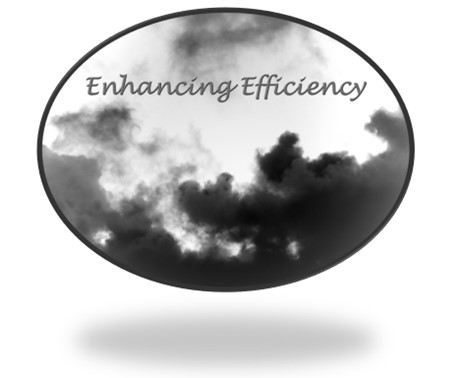Different Forms of Energy
Enhancing Efficiency
Conversation With Chat GPT4 27 March 2024
Series: Energy Articles

Enhancing Efficiency Artwork
F McCullough Copyright 2024 ©
Different Forms of Energy And The Role of Generative AI In Enhancing Efficiency
Energy, in its various forms, powers everything from the smallest cellular processes to the largest industrial operations. Understanding these forms is crucial for harnessing energy efficiently and sustainably. Furthermore, the advent of generative Artificial Intelligence (AI) presents novel opportunities for enhancing energy efficiency across multiple sectors. Let's explore the myriad forms of energy and delve into how generative AI contributes to optimising energy use.
Forms Of Energy
Energy manifests in several distinct forms, each with unique characteristics and applications. Here's an overview of the primary forms of energy:
Kinetic Energy
Definition: Energy possessed by an object due to its motion.
Applications: Wind turbines convert the kinetic energy of wind into electrical energy.
Potential Energy
Definition: Stored energy based on an object's position or state.
Applications: Hydroelectric dams utilise the potential energy of stored water, converting it into electricity.
Thermal (Heat) Energy
Definition: Energy that comes from the temperature of matter. The faster the particles of an object move, the higher its temperature and thus, its thermal energy.
Applications: Geothermal power plants harness the Earth's heat energy to generate electricity.
Chemical Energy
Definition: Energy stored in the bonds of chemical compounds, released or absorbed during chemical reactions.
Applications: Batteries store chemical energy and convert it into electrical energy when used.
Electrical Energy
Definition: Energy caused by the movement of electrons. It's what powers our homes and industries.
Applications: Almost ubiquitous, from lighting and heating to powering machinery and electronic devices.
Nuclear Energy
Definition: Energy stored in the nucleus of atoms that can be released through fission or fusion reactions.
Applications: Nuclear power plants generate electricity through nuclear fission.
Renewable Energy
Subtypes: Includes solar, wind, hydroelectric, and geothermal energy, all of which are replenished naturally and have lower environmental impacts.
Applications: Varies widely, from solar panels converting sunlight into electricity to wind turbines and beyond.
Generative AI And Energy Efficiency
Generative AI, a subset of AI technologies capable of creating new content and solutions, is making significant strides in enhancing energy efficiency. Hereís how:
Optimising Renewable Energy Production
Wind and Solar Power Forecasting: Generative AI can predict wind speeds and solar irradiance with high accuracy, enabling optimal scheduling and maximising the output of renewable energy sources.
Enhancing Energy Storage
Battery Technology: Generative AI algorithms can design new materials for batteries, improving their capacity, lifespan, and efficiency, thereby facilitating better energy storage solutions.
Smart Grid Management
Demand Response Optimisation: Generative AI models can predict energy demand patterns and adjust supply accordingly, enhancing the efficiency of power distribution networks.
Building And Infrastructure
Energy-Efficient Design: AI can generate optimal designs for buildings and other infrastructures to maximise natural light and ventilation, reducing the need for artificial heating, cooling, and lighting.
Industrial Efficiency
Process Optimisation: In manufacturing, generative AI can create more efficient processes, reduce waste, and optimise energy use, leading to significant energy savings.
Summary
The various forms of energy, from kinetic to nuclear, each play crucial roles in powering our world. As we advance, the integration of generative AI into energy systems promises to revolutionise how we produce, store, and consume energy, driving efficiency improvements across the board. By harnessing the potential of these technologies, we could move towards a more sustainable and energy-efficient future.
Key Takeaways
In examining the diverse forms of energy and the impact of generative AI on enhancing efficiency, it's likely that technological advancements offer promising potential solutions for sustainable energy management and utilisation, highlighting a path towards a more efficient and environmentally friendly future.
Conversation with Open AIís ChatGPT4 Reviewed, Revised and Edited by F McCullough, Copyright 2024 ©
Artwork

Smart Grid Energy Artwork
F McCullough Copyright 2024 ©
Links
Agriculture
Articles
Artificial Intelligence
Business
Ecology
Education
Energy
Finance
Genomics
Goats
Health
History
Leadership
Marketing
Medicine
Museums
Photographs & Art Works
Artworks, Design & Photographs Index
Other Photographs & Art Works By F McCullough
Places To Visit
Other Museums And Places To Visit
Plants
Poetry
Research
Science & Space
Science & Space Articles & Conversations
Short Stories
Songs
Technology
Thought Of The Day
Every challenge in transitioning to clean energy
to innovate and lead with purpose.

Clean Energy Artwork
F McCullough Copyright 2024 ©
Information
Image Citations
- Enhancing Efficiency Artwork F McCullough Copyright 2024 ©
- Smart Grid Energy Artwork F McCullough Copyright 2024 ©
- Clean Energy Artwork F McCullough Copyright 2024 ©
Table Of Contents
Different
Forms of Energy And The Role of Generative AI In Enhancing Efficiency
Generative AI
And Energy Efficiency
Optimising
Renewable Energy Production
Copyright
Keywords: adaptive leadership,
artificial intelligence, bioenergy, carbon capture and storage, circular
economy, clean energy transition, climate change, data analytics, digital
transformation, energy efficiency, energy storage, environmental stewardship,
ethical leadership, global energy markets, innovation, leadership skills,
renewable energy, smart technologies, stakeholder engagement, sustainability,
technological disruption, waste-to-energy, wind and solar power,
Hashtags: #adaptiveleadership,
#artificialintelligence, #bioenergy, #carboncaptureandstorage,
#circulareconomy, #cleanenergytransition, #climatechange, #dataanalytics,
#digitaltransformation, #energyefficiency, #energystorage,
#environmentalstewardship, #ethicalleadership, #globalenergymarkets,
#innovation, #leadershipskills, #renewableenergy, #smarttechnologies,
#stakeholderengagement, #sustainability, #technologicaldisruption,
#wastetoenergy, #windandsolarpower
Created: 27 March 2024
Published: 27 March 2024
